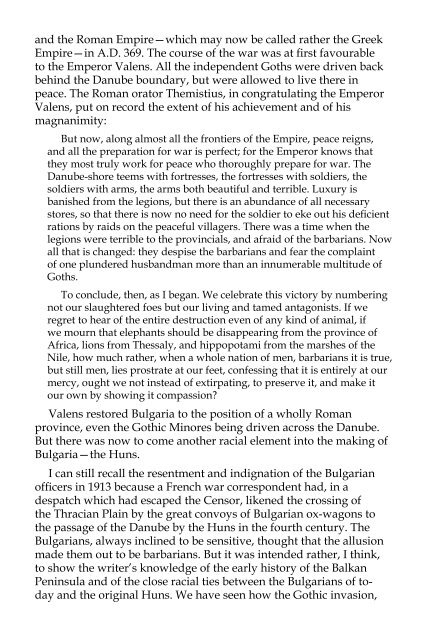Bulgaria e-book - iMedia
Bulgaria e-book - iMedia
Bulgaria e-book - iMedia
You also want an ePaper? Increase the reach of your titles
YUMPU automatically turns print PDFs into web optimized ePapers that Google loves.
and the Roman Empire—which may now be called rather the Greek<br />
Empire—in A.D. 369. The course of the war was at first favourable<br />
to the Emperor Valens. All the independent Goths were driven back<br />
behind the Danube boundary, but were allowed to live there in<br />
peace. The Roman orator Themistius, in congratulating the Emperor<br />
Valens, put on record the extent of his achievement and of his<br />
magnanimity:<br />
But now, along almost all the frontiers of the Empire, peace reigns,<br />
and all the preparation for war is perfect; for the Emperor knows that<br />
they most truly work for peace who thoroughly prepare for war. The<br />
Danube-shore teems with fortresses, the fortresses with soldiers, the<br />
soldiers with arms, the arms both beautiful and terrible. Luxury is<br />
banished from the legions, but there is an abundance of all necessary<br />
stores, so that there is now no need for the soldier to eke out his deficient<br />
rations by raids on the peaceful villagers. There was a time when the<br />
legions were terrible to the provincials, and afraid of the barbarians. Now<br />
all that is changed: they despise the barbarians and fear the complaint<br />
of one plundered husbandman more than an innumerable multitude of<br />
Goths.<br />
To conclude, then, as I began. We celebrate this victory by numbering<br />
not our slaughtered foes but our living and tamed antagonists. If we<br />
regret to hear of the entire destruction even of any kind of animal, if<br />
we mourn that elephants should be disappearing from the province of<br />
Africa, lions from Thessaly, and hippopotami from the marshes of the<br />
Nile, how much rather, when a whole nation of men, barbarians it is true,<br />
but still men, lies prostrate at our feet, confessing that it is entirely at our<br />
mercy, ought we not instead of extirpating, to preserve it, and make it<br />
our own by showing it compassion?<br />
Valens restored <strong>Bulgaria</strong> to the position of a wholly Roman<br />
province, even the Gothic Minores being driven across the Danube.<br />
But there was now to come another racial element into the making of<br />
<strong>Bulgaria</strong>—the Huns.<br />
I can still recall the resentment and indignation of the <strong>Bulgaria</strong>n<br />
officers in 1913 because a French war correspondent had, in a<br />
despatch which had escaped the Censor, likened the crossing of<br />
the Thracian Plain by the great convoys of <strong>Bulgaria</strong>n ox-wagons to<br />
the passage of the Danube by the Huns in the fourth century. The<br />
<strong>Bulgaria</strong>ns, always inclined to be sensitive, thought that the allusion<br />
made them out to be barbarians. But it was intended rather, I think,<br />
to show the writer’s knowledge of the early history of the Balkan<br />
Peninsula and of the close racial ties between the <strong>Bulgaria</strong>ns of today<br />
and the original Huns. We have seen how the Gothic invasion,<br />
coming from the Baltic to the Black Sea, pushed on to the borders of<br />
the Hun people living east of the Volga. These Huns now prepared<br />
an answering wave of invasion.<br />
To the Goths the Huns—the first of the Tartar hordes to invade<br />
Europe—were a source of superstitious terror. The Gothic historian<br />
Jordanes writes with frank horror of them:<br />
We have ascertained that the nation of the Huns, who surpassed all<br />
others in atrocity, came thus into being. When Filimer, fifth king of the<br />
Goths, after their departure from Sweden, was entering Scythia, with<br />
his people, as we have before described, he found among them certain<br />
sorcerer-women, whom they call in their native tongue Haliorunnas,<br />
whom he suspected and drove forth from his army into the wilderness.<br />
The unclean spirits that wander up and down in desert places, seeing<br />
these women, made concubines of them; and from this union sprang<br />
that most fierce people, the Huns, who were at first little, foul, emaciated<br />
creatures, dwelling among the swamps and possessing only the shadow<br />
of human speech by way of language.<br />
According to Priscus they settled first on the eastern shore of the Sea<br />
of Azof, lived by hunting, and increased their substance by no kind of<br />
labour, but only by defrauding and plundering their neighbours.<br />
Once upon a time when they were out hunting beside the Sea of Azof,<br />
a hind suddenly appeared before them, and having entered the water of<br />
that shallow sea, now stopping, now dashing forward, seemed to invite<br />
the hunters to follow on foot. They did so, through what they had before<br />
supposed to be trackless sea with no land beyond it, till at length the<br />
shore of Scythia lay before them. As soon as they set foot upon it, the stag<br />
that had guided them thus far mysteriously disappeared. This, I trow,<br />
was done by those evil spirits that begat them, for the injury of the Goths.<br />
But the hunters who had lived in complete ignorance of any other land<br />
beyond the Sea of Azof were struck with admiration of the Scythian land<br />
and deemed that a path known to no previous age had been divinely<br />
revealed to them. They returned to their comrades to tell them what had<br />
happened, and the whole nation resolved to follow the track thus opened<br />
out before them. They crossed that vast pool, they fell like a human<br />
whirlwind on the nations inhabiting that part of Scythia, and offering up<br />
the first tribes whom they overcame, as a sacrifice to victory, suffered the<br />
others to remain alive, but in servitude.<br />
With the Alani especially, who were as good warriors as themselves,<br />
but somewhat less brutal in appearance and manner of life, they had<br />
many a struggle, but at length they wearied out and subdued them.<br />
For, in truth, they derived an unfair advantage from the intense<br />
hideousness of their countenances. Nations whom they would never<br />
have vanquished in fair fight fled horrified from those frightful—faces





